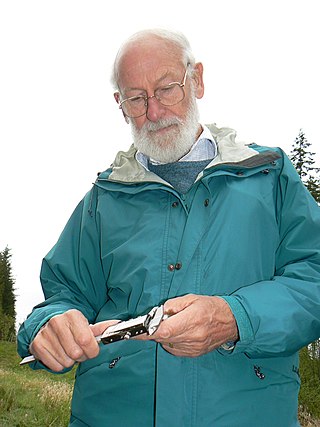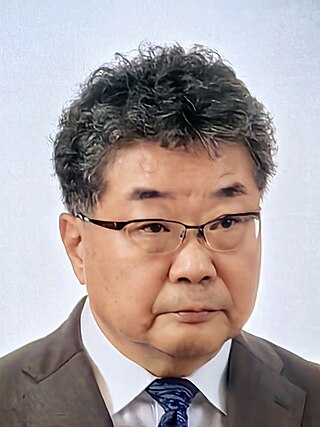
The Kyoto Prize is Japan's highest private award for lifetime achievement in the arts and sciences. It is given not only to those that are top representatives of their own respective fields, but to "those who have contributed significantly to the scientific, cultural, and spiritual betterment of mankind". The Kyoto Prize was created in collaboration with the Nobel Foundation and is regarded by many as Japan's version of the Nobel Prize, representing one of the most prestigious awards available in fields that are not traditionally honored with a Nobel.

Peter Raymond Grant and Barbara Rosemary Grant are a British married couple who are evolutionary biologists at Princeton University. Each currently holds the position of emeritus professor. They are known for their work with Darwin's finches on Daphne Major, one of the Galápagos Islands. Since 1973, the Grants have spent six months of every year capturing, tagging, and taking blood samples from finches on the island. They have worked to show that natural selection can be seen within a single lifetime, or even within a couple of years. Charles Darwin originally thought that natural selection was a long, drawn out process but the Grants have shown that these changes in populations can happen very quickly.

Paul Edward Farmer was an American medical anthropologist and physician. Farmer held an MD and PhD from Harvard University, where he was a University Professor and the chair of the Department of Global Health and Social Medicine at Harvard Medical School. He was the co-founder and chief strategist of Partners In Health (PIH), an international non-profit organization that since 1987 has provided direct health care services and undertaken research and advocacy activities on behalf of those who are sick and living in poverty. He was professor of medicine and chief of the Division of Global Health Equity at Brigham and Women’s Hospital.

Alfred George Knudson, Jr. was an American physician and geneticist specializing in cancer genetics. Among his many contributions to the field was the formulation of the Knudson hypothesis in 1971, which explains the effects of mutation on carcinogenesis.

Kazuo Inamori, was a Japanese philanthropist, entrepreneur, Zen Buddhist priest, and the founder of Kyocera and KDDI. He was the chairman of Japan Airlines.
Simon Asher Levin is an American ecologist and the James S. McDonnell Distinguished University Professor in Ecology and Evolutionary Biology and the director of the Center for BioComplexity at Princeton University. He specializes in using mathematical modeling and empirical studies in the understanding of macroscopic patterns of ecosystems and biological diversities.

The Alexander von Humboldt Foundation is a foundation that promotes international academic cooperation between select scientists and scholars from Germany and from abroad. It was established by the government of the Federal Republic of Germany and is funded by the Federal Foreign Office, the Federal Ministry of Education and Research, the Federal Ministry for Economic Cooperation and Development as well as other national and international partners.

Isamu Akasaki was a Japanese engineer and physicist, specializing in the field of semiconductor technology and Nobel Prize laureate, best known for inventing the bright gallium nitride (GaN) p-n junction blue LED in 1989 and subsequently the high-brightness GaN blue LED as well.

Takeo Kanade is a Japanese computer scientist and one of the world's foremost researchers in computer vision. He is U.A. and Helen Whitaker Professor at Carnegie Mellon School of Computer Science. He has approximately 300 peer-reviewed academic publications and holds around 20 patents.

George Harry Heilmeier was an American engineer, manager, and a pioneering contributor to liquid crystal displays (LCDs), for which he was inducted into the National Inventors Hall of Fame. Heilmeier's work is an IEEE Milestone.

Graham Douglas Farquhar, is an Australian biophysicist, Distinguished Professor at Australian National University, and leader of the Farquhar Lab. In 2018 Farquhar was named Senior Australian of the Year.

The Kyoto Prize in Arts and Philosophy is awarded once a year by the Inamori Foundation for lifetime achievements in the arts and philosophy. The Prize is one of three Kyoto Prize categories; the others are the Kyoto Prize in Advanced Technology and the Kyoto Prize in Basic Sciences. The first Kyoto Prize in Arts and Philosophy was awarded to Olivier Messiaen in 1985, the "greatest composer to have emerged from 20th century France". The Prize is widely regarded as the most prestigious award available in fields not traditionally honored with a Nobel Prize.

Karl Alexander Deisseroth is an American scientist. He is the D.H. Chen Foundation Professor of Bioengineering and of psychiatry and behavioral sciences at Stanford University.

The Kyoto Prize in Advanced Technology is awarded once a year by the Inamori Foundation. The Prize is one of three Kyoto Prize categories; the others are the Kyoto Prize in Basic Sciences and the Kyoto Prize in Arts and Philosophy. The first Kyoto Prize in Advanced Technology was awarded to Rudolf E. Kálmán, the "creator of modern control and system theory". The Prize is widely regarded as the most prestigious award available in fields which are traditionally not honored with a Nobel Prize.

William David Kingery was an American material scientist who developed systematic methods for the study of ceramics. For his work, he was awarded the Kyoto Prize in 1999.

Kazutoshi Mori is a Japanese molecular biologist known for research on unfolded protein response. He is a professor of Biophysics at the Graduate School of Science, Kyoto University, and shared the 2014 Albert Lasker Basic Medical Research Award with Peter Walter for discoveries concerning the unfolded protein response — an intracellular quality control system that detects harmful misfolded proteins in the endoplasmic reticulum and signals the nucleus to carry out corrective measures.

Tasuku Honjo is a Japanese physician-scientist and immunologist. He won the 2018 Nobel Prize in Physiology or Medicine and is best known for his identification of programmed cell death protein 1 (PD-1). He is also known for his molecular identification of cytokines: IL-4 and IL-5, as well as the discovery of activation-induced cytidine deaminase (AID) that is essential for class switch recombination and somatic hypermutation.

The Kyoto Prize in Basic Sciences is awarded once a year by the Inamori Foundation. The Prize is one of three Kyoto Prize categories; the others are the Kyoto Prize in Advanced Technology and the Kyoto Prize in Arts and Philosophy. The first Kyoto Prize in Basic Sciences was awarded to Claude Elwood Shannon, the “Establishment of Mathematical Foundation of Information Theory”. The Prize is regarded as a prestigious award available in fields which are traditionally not honored with a Nobel Prize.
The Inamori Ethics Prize is an annual award presented by the Inamori International Center for Ethics and Excellence at Case Western Reserve University. The prize honors exemplary ethical international leaders "whose actions and influence have greatly improved the condition of humankind". The prize was first awarded in 2008 to Dr. Francis Collins, an American physician who is credited with discovering a number of genes associated with human diseases.













